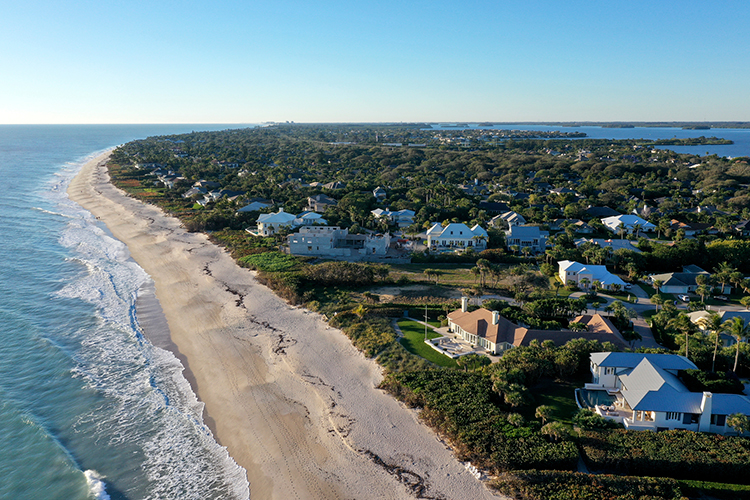
The county may lose millions in critical funding to reinforce dunes and beaches from just south of Castaway Cove to The Moorings if a handful of oceanfront homeowners don’t consent to have the work completed this fall.
So far, the county has failed to convince them, and if workers cannot start placing sand on beaches when the turtle nesting season ends in November, state and federal funding for the replenishment project will be lost, County Commission Chair Joe Earman said.
Up and down the 32963 island’s 22 miles of beaches, most oceanfront residents eagerly await their turn to have crews shore up their storm-chewed beaches with sand, and projects have progressed more-or-less on schedule.
But a portion of the barrier island called “Sector 7” is the exception.
Deemed critically eroded several years ago, the South County replenishment project can’t move forward without property owners signing easements to permit the county access to the beach in front of their homes from the mean high waterline westward.
There is some confusion as to whether 90 percent or 85 percent of the property owners in the project area must agree to the easements in order for work to begin, but at present, only 67 percent of Sector 7 residents have a signed easement on file with the county.
A number of residents still are holding out. Their major concerns are that the easement does not provide that it is only for beach replenishment purposes, and the proposed easement has no defined end date.
Earman is asking property owners to look at the big picture. “We’re just saying, ‘Hey, sign this easement and you never have to worry about us again. We’re not coming to put an umbrella up on your beach and have some iced tea and sit there,’” Earman said.
But Sandpointe resident Doug Demuth said, “We discussed easement language, things that we thought that our residents could accept, and (the county) used none of it.
“They created this ‘in perpetuity, don’t call it in perpetuity’ easement and sent it out,” Demuth said. “We’ve got a lot of smart people out where we live and everyone is going to look at this and say, ‘This is the same thing you sent to us before, and we’re not going to sign it.’”
Of the 15 properties whose owners have declined to sign, eight are in the very northern part of Sector 7, just below Castaway Cove and north of Smuggler’s Cove, where Demuth said beaches accrete naturally leaving little reason for them to agree to the easement.
At the Feb. 21 County Commission meeting, Demuth proposed a change in the proposed project area.
If the sand replenishment could begin south of Smuggler’s Cove, just south of the bulk of the properties that have currently declined easements or not responded, 83 percent of homes from that point to The Moorings have agreed to easements, he said – and Demuth thinks a few more are reachable.
However, the property owners in that stretch who have until now declined to sign easements have concerns as well.
“We talked to one of the property owners in the southern area and she voiced similar concerns to the north,” Demuth said. “She says, ‘My lawyer tells me we shouldn’t sign any in perpetuity easement.’
“I recommended that a defined easement end date be put in place, similar to the 15-year easements used in the past,” Demuth said. “Commissioner Earman stated that the staff would accept a 20-year term but this disappeared. Also, one of the people in our working group offered the county easement language that would be acceptable.”
That language would narrow the scope of the easement, making clear it was being granted “for beach replenishment purposes only.”
“We could get at least one or two others south of (Smugglers Cove) which would get us over the 85 percent acceptance rate and we could have a go project,” Demuth said.
“If you do nothing, you’ll create such a mess out there that the cost to replenish will be so high, and damage to so many properties will have occurred, that it will be impossible for the county to do anything at that point, forever,” Demuth added.
While some parts of Florida are dealing with similar concerns, beach replenishment plans in much of the state are on track. On Jan. 18, Gov. Ron DeSantis announced that $100 million will be awarded to beach erosion projects around Florida, with Indian River County receiving $4,080,388.
The funds, which will be administered from the Florida Department of Environmental Protection, were approved in a December special session of the Florida Legislature. The construction costs for five local projects are estimated to be $33.6 million in total and $8.4 million with FEMA assistance.
As of Monday, the county had concluded work in six areas: Ambersand Beach, Golden Sand Beach Park, Tracking Station Beach Park, Seagrape Trail Beach, Wabasso Beach and Turtle Trail Beach.



